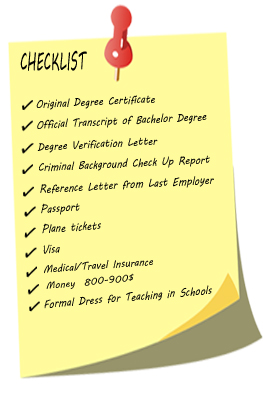EXPECTATIONS
Expectations from TEFL Teachers in Thailand
Drugs
Narcotism and use of illegal drugs not only promises to damage the career of an ESL teacher in Thailand, but also is a prosecutable activity under Thai law. The laws are strict and penalties are crushing for use and trafficking of illegal drugs in the country. The ESL teacher certified by ACT and teaching in Thailand by choice is expected to be responsible and sensible enough to comprehend and accordingly respect Thai laws and regulations.
Thai culture
Thailand is identified for the preservation and extension of its archaic culture. Thais are quite passionate about their cultural heritage and expect similar conduct from the foreign teachers. Therefore, absorbing and adapting to Thai culture and customs, respecting rites and beliefs, at least superficially is considered to be a healthy effort that can augment one’s teaching career in Thailand. Sound understanding and accepting of Thai culture will also help the foreign ESL teacher to better explore the beautiful country, after acquiring the TESOL certificate and completing the teaching assignment.
Public expression of anger or agitation and indulgence in violence and confrontation is bound to earn aversion for a foreigner in Thailand. Such a behavior is considered negative and degrading amongst the Thais and results in ‘loss of face’. Aggressive and abrasive mode of communication is detested in Thailand. It is thoroughly recommended for all native English speakers to temporarily mould one’s conduct towards politeness, till the time they chose to live in Thailand. It is always wise to discuss individual problems and dissatisfactions with ACT, rather than exploding in public. A calm, friendly, understanding, patient and smiling person will achieve far greater things in Thailand than someone who is hot-headed or quick-tempered. Expressing anger will only be aggravating the worse.
Discrepancies
As many of the schools that ACT work with have never had foreign teachers or have had little exposure to foreign teachers and cultures, there will undoubtedly be some ‘hiccups’ along the way. Any discrepancies that arise between what the school asks the TESOL-trained teacher to do and the contract the ESL teacher have with ACT should be reported to the ACT Coordinator. Often times these discrepancies result from a communication error. By allowing the school and ACT to discuss the matter, it is hoped, and been proven, that most of these issues can be resolved much easier, faster and with less cultural tensions than if the teacher attempt to resolve them alone. Often these schools want their ESL teacher to do many extra little things because they want to take advantage of the fact that they finally have a foreigner working at their school. It can be easy to get frustrated and angry, but this will get nowhere in Thailand. *If you don’t mind doing a few extra little things… great, AND this is the best way to get involved and score extra PAID work after school hours. The more involved you are, the more liked you will be and the more people you will meet, thus more opportunities will arise. However, we all need our own time and you will need to know when to say “Sorry, I can’t do that”.



 I heard great things about this TESOL course from 4 different people who went through it last year. I have always wanted to travel and teach, so this program was perfect for me.
I heard great things about this TESOL course from 4 different people who went through it last year. I have always wanted to travel and teach, so this program was perfect for me.  After looking at other programs in Thailand, I found ACT was offering the lowest price. Also, Kiersten and I came together and her friends had previously done the ACT program and they had nothing but good things to say about the program.
After looking at other programs in Thailand, I found ACT was offering the lowest price. Also, Kiersten and I came together and her friends had previously done the ACT program and they had nothing but good things to say about the program.  The ACT program seemed to be a great way to receive hands on training. It was a great learning experience. Sangeeta and Pak did a great job throughout and I was continually impressed with them and how professional the company was.
The ACT program seemed to be a great way to receive hands on training. It was a great learning experience. Sangeeta and Pak did a great job throughout and I was continually impressed with them and how professional the company was. 